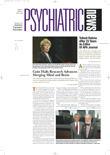Though there has been limited focus on the problem of domestic violence by the field of psychiatry, there is a high prevalence of domestic violence in mental health settings, according to psychiatrists who are experts in treating domestic violence.
At APA's annual meeting in New York City last month, they discussed how best to address the mental health needs of patients who are victims of domestic violence.
Domestic violence and mental health problems are often intertwined, according to Carole Warshaw, M.D., director of the Domestic Violence and Mental Health Policy Initiative in Chicago and a member of APA's Committee on Family Violence and Abuse. For example, studies show that from 42 percent to 46 percent of women in outpatient mental health settings have experienced physical abuse, and 29 percent to 38 percent have experienced sexual abuse as adults.
For women patients with serious mental illnesses, these rates are twice as high. Further, studies of women enrolled in domestic violence programs have shown high prevalence rates of mental illness, according Warshaw.
In 2000, researcher Jacqueline Golding, Ph.D., found that mean prevalence rates of posttraumatic stress disorder (PTSD) among women in these settings is 61 percent. About 50 percent of these women experienced depression symptoms, and 20 percent exhibited suicidal behavior.
Complicating matters is the fact that women with severe mental illness who reveal that they are victims of domestic violence may not be taken seriously by the medical community.
“Not infrequently, reports of abuse are attributed to delusions,” Warshaw said, adding, “but we know that an episode of abuse often precipitates psychotic decompensation.”
Warshaw also pointed out that “the symptoms and stigma associated with mental illness can increase women's vulnerability to being controlled by an abusive partner.”
The partner may tell the woman and others that she is crazy, for instance, or have her committed to a psychiatric hospital and then speak on her behalf, Warshaw noted. After an episode of violence, it is not uncommon for abusers to rationalize their behavior by saying they were just trying to restrain a partner who was “out of control,” Warshaw pointed out.
Psychiatrists should be aware that symptoms related to trauma resulting from domestic violence may look similar to symptoms of serious mental illness, Warshaw said. For instance, flashbacks may be confused with hallucinations, and emotional lability and affect dysregulation associated with complex trauma may be mistaken for symptoms of bipolar disorder. Some women may have symptoms related to ongoing trauma plus one or two comorbid psychiatric disorders,“ but there has not been much written about how these conditions intersect,” she said.
Some symptoms of PTSD—avoidance and dissociation, for example—can hinder an abused woman's ability to get out of a dangerous situation, Warshaw pointed out. The symptoms “can prevent women from mobilizing the resources they need to stay safe or to protect their children from danger,” she said, by increasing a woman's chance of being isolated and controlled by an abusive partner.
Abuse Causes Pervasive Dysfunction
According to Sandra Bloom, M.D., a Philadelphia psychiatrist and president and CEO of Community Works, an organization focusing on reducing the potential for conflict and violence in a number of settings, women who have endured abuse can develop a wide-ranging set of maladaptive behaviors including substance abuse, aggression, criminal behaviors, and self-harming behaviors such as cutting “that are all ways to cope with unmanageable emotions.”
Abuse can disrupt a person's ability to form normal attachments with others, Bloom noted, resulting in problematic relationships for the person who has been abused. In these relationships, “there may be no sense of boundaries because [the abused person's] boundaries have been repeatedly violated,” she said.
Psychiatrists who work with those who have been abused “will see people who have learned to be helpless because they cannot master the violence” and feel powerless to stop it, Bloom said, but at the same time are often controlling “because their lives are so out of control.”
Those who have endured years of abuse may tend to feel demoralized and profoundly hopeless, she said. A patient's basic assumptions about “the world and self” have been shattered.
When treating patients who are victims of domestic abuse, Warshaw said, psychiatrists should first determine whether their patient is safe. Some of the questions psychiatrists should ask during a safety assessment include whether the abuse is escalating in frequency, what is the nature or severity of threats, whether the patient is being stalked, whether the abuser is depressed or suicidal, and whether the abuser exhibits pathological jealousy and has access to a weapon.
In addition, it's important to determine whether the patient is planning to leave her abusive partner and whether the partner is aware of the plan.
Together, psychiatrist and patient can work to identify the risk factors for escalating violence and strategies to reduce this risk. It's also a good idea for psychiatrists and patients to develop a safety plan for the patient to use when violence erupts in the home, Warshaw said. Determining a safe location to which the patient can escape in an emergency and teaching children how and when to call 911 may be part of that plan.
Psychiatrists can also refer abused patients to local domestic violence programs or hotlines for additional information about the problem, she added. Many domestic violence programs provide legal assistance, job training, and literacy training.
In addition, psychiatrists should focus on patients' strengths and skill development during treatment, Warshaw said. “Helping women access aspects of themselves that have been lost after years of abuse” is critical, she added.
More information about addressing the mental health needs of domestic violence victims is posted online at<www.dvmhpi.org>.▪

